12 Best Music Theory Games to Master Your Skills (2025)
Discover the top 12 music theory games to sharpen your ear and understanding. Our 2025 guide details the best tools for fun, effective learning.
Posted by
Joe Brewer12 Best Music Theory Games to Master Your Skills (2025)
Learning music theory often feels like a chore, filled with repetitive drills and abstract concepts that can drain your motivation. But what if you could sharpen your skills while actually having fun? The world of music theory games transforms tedious practice into an engaging, interactive experience, making complex topics feel more like play than work. These tools are designed to solve the problem of dry, uninspired study sessions by gamifying the learning process.
This guide cuts through the noise to bring you a curated list of the best platforms available. Whether you're a beginner struggling with note names or an advanced musician refining your ear for complex harmonies, there's a game perfectly suited for your goals. We move beyond simple descriptions to provide a detailed analysis of each resource, complete with screenshots and direct links for easy access.
Our goal is to help you find the right tool for your specific needs quickly. We'll explore each option's unique strengths, practical applications, and even its limitations, so you can confidently choose the best platform to level up your musicianship. Forget boring flashcards; it's time to discover how music theory games can become your new favorite practice partner.
1. My Ear Training Journey: Gamified Path to Relative Pitch
For musicians who find traditional ear training exercises tedious, My Ear Training Journey offers a compelling and effective alternative. This platform excels by transforming the difficult practice of developing relative pitch into an engaging, gamified quest. It moves beyond rote memorization, creating an interactive environment where learning feels like progress in a well-designed game, making it one of the most innovative music theory games available.
Its core strength lies in its laser focus on relative pitch, a fundamental skill for any musician. Instead of simply playing intervals and asking for identification, the platform integrates them into dynamic challenges and leaderboards, fostering a sense of community and friendly competition. This approach is particularly effective for learners who thrive on consistent, measurable progress and positive reinforcement.
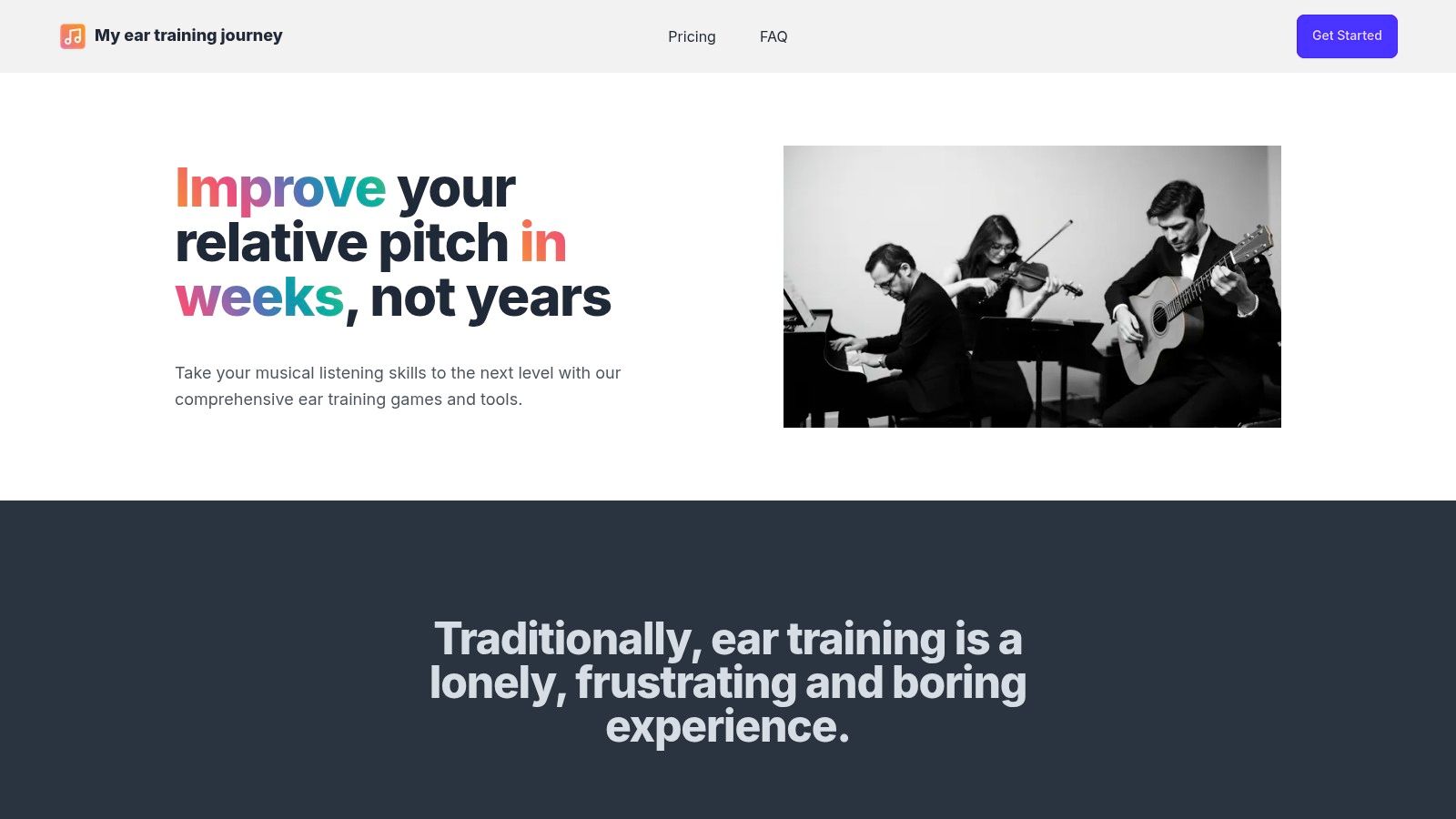
Key Strengths and Use Cases
The platform's design is ideal for self-directed learners, such as a guitarist struggling to transcribe solos or a vocalist aiming to improve their pitch accuracy. A practical approach involves dedicating just 10-15 minutes daily to the platform's games. This consistency builds a strong foundation, progressing from basic intervals like perfect fifths to more complex challenges involving chord qualities and progressions.
Expert Insight: What makes My Ear Training Journey stand out is its community-driven interval database. This unique feature allows users to practice with real-world musical examples submitted by other musicians, bridging the gap between abstract exercises and practical application.
Practical Considerations
While its specialization in relative pitch is a major strength, it is not a comprehensive music theory curriculum. To develop a well-rounded skill set, users will need to supplement their learning with resources covering rhythm, sight-reading, and harmonic analysis. The platform's model is also built around daily engagement; learners with sporadic practice schedules may not experience the full benefit of its progressive, habit-building structure.
Platform Highlights:
- Best For: Musicians focused on improving relative pitch and interval recognition.
- Core Feature: A deeply gamified learning path with points, levels, and leaderboards.
- Access: The platform is web-based and offers several free trial levels. Full access requires an affordable monthly subscription or a discounted lifetime membership option.
- Website: myeartrainingjourney.com
2. Three Minute Theory
Three Minute Theory offers a comprehensive, curriculum-based approach that integrates short video lessons with a vast library of interactive music theory games. Designed primarily for educators, it excels in a structured learning environment, whether in the classroom or for assigning homework. Its unique 'choose-your-own-adventure' format allows teachers to tailor the learning path to specific student needs, moving beyond random drills to build a solid foundation in music literacy.
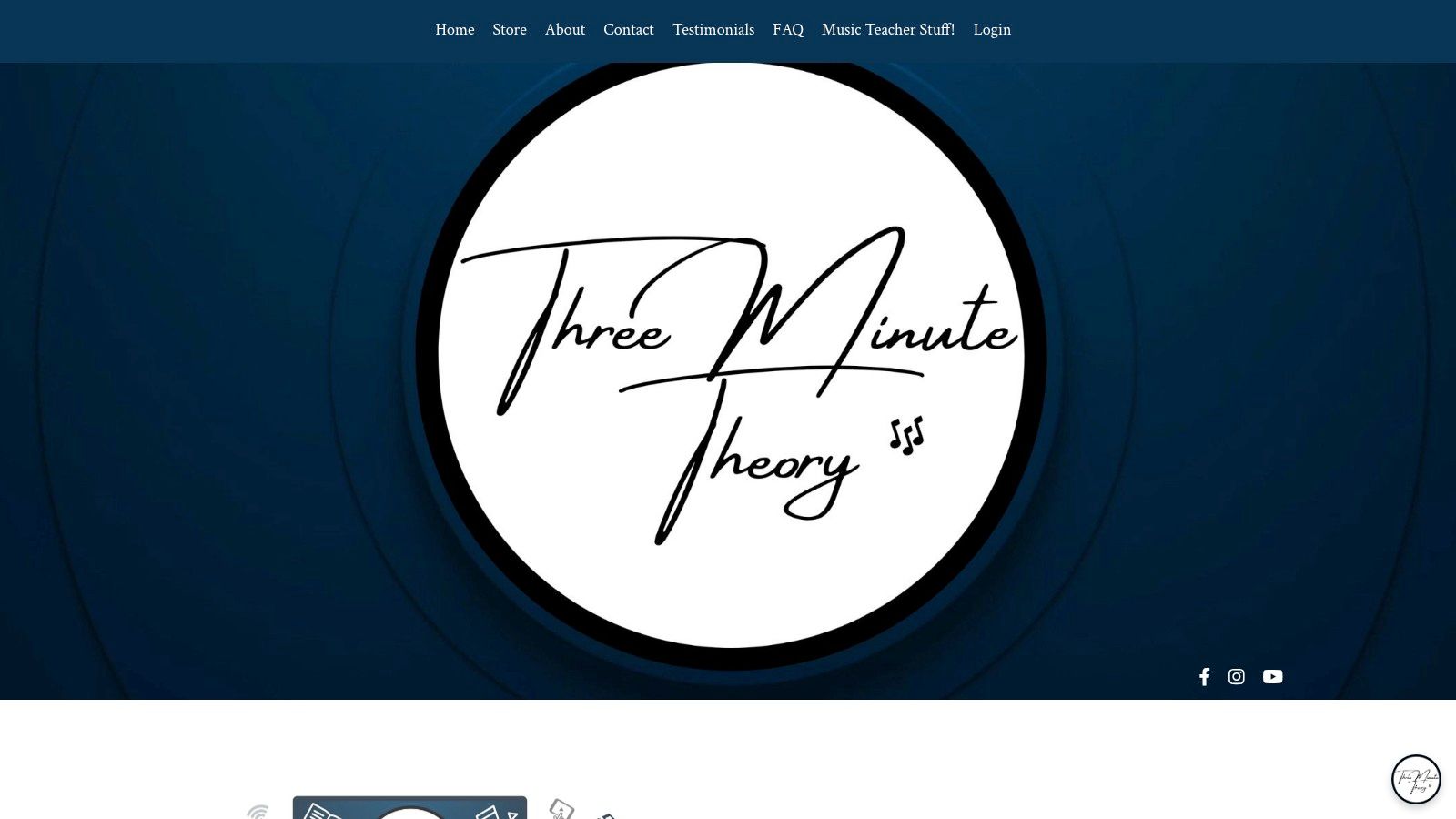
The platform stands out by requiring no student logins, which simplifies classroom management significantly. After a short video lesson, students can dive into one of over 230 games designed to reinforce the concept just taught. This immediate application is key to its effectiveness. While it’s subscription-based and geared towards school programs, its structured content is a powerful tool for any teacher looking to gamify their curriculum. The Composer AI and custom Kahoots are fantastic bonuses that add variety and engagement to the learning process.
Key Features & Considerations
| Feature | Details |
|---|---|
| Best For | Classroom integration, structured curriculum, beginner to intermediate students. |
| Access | Subscription-based. Pricing is geared towards educators and schools. |
| Content | 80 video lessons, 230+ games, Composer AI, Kahoots. |
| Pros | Comprehensive curriculum, high student engagement, no student logins needed. |
| Cons | Not ideal for individual, self-guided learners; subscription cost may be a barrier. |
Website: Three Minute Theory
3. Learnatune Music Games
Learnatune offers a vibrant collection of online music theory games designed to make learning engaging and interactive for students of all levels. It excels by providing a wide variety of games that cover essential topics like note reading, intervals, scales, and key signatures. The platform is particularly useful for teachers who want to create customized learning experiences, thanks to its highly adaptable game settings and multiplayer modes that foster a collaborative and competitive classroom environment.
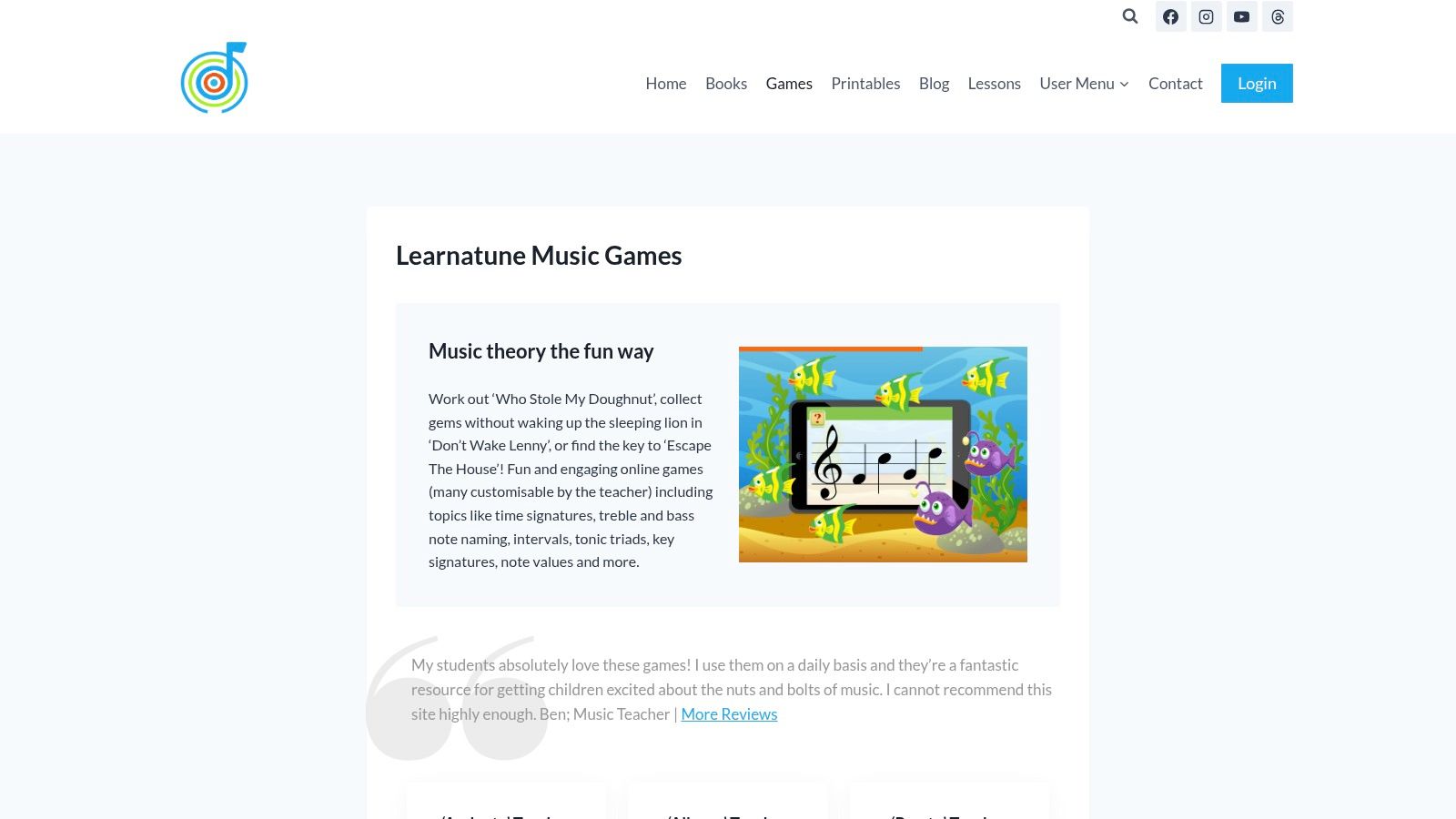
With over 160 games organized into distinct collections, Learnatune stands out for its sheer volume and focus on fun. Teachers can easily find a game to reinforce a specific concept and tailor it to match their students' abilities. The addition of multiplayer options transforms standard drills into exciting challenges, perfect for group activities. While the platform is subscription-based, its affordable plans and bonus PDF resources provide significant value, making it a strong contender for educators seeking flexible and entertaining music theory games.
Key Features & Considerations
| Feature | Details |
|---|---|
| Best For | Teachers seeking customizable games, multiplayer classroom activities, and broad topic coverage. |
| Access | Subscription-based. Affordable plans for individuals and educators. |
| Content | Over 160 games, customizable settings, multiplayer modes, bonus PDF resources. |
| Pros | Wide variety of engaging games, multiplayer options boost interaction, affordable subscription. |
| Cons | Customization can be time-consuming for teachers; subscription is priced in GBP, which may cause cost fluctuations. |
Website: Learnatune Music Games
4. Theta Music Trainer
Theta Music Trainer provides a broad suite of ear training and music theory games specifically designed to hone core musicianship skills. It moves beyond simple note identification, offering over 50 distinct games that target pitch, rhythm, harmony, and scales. This platform is particularly effective for musicians who want to develop a more intuitive and responsive musical ear through consistent, targeted practice. Its structured yet flexible approach allows users to follow personalized training paths or simply focus on areas they find most challenging.
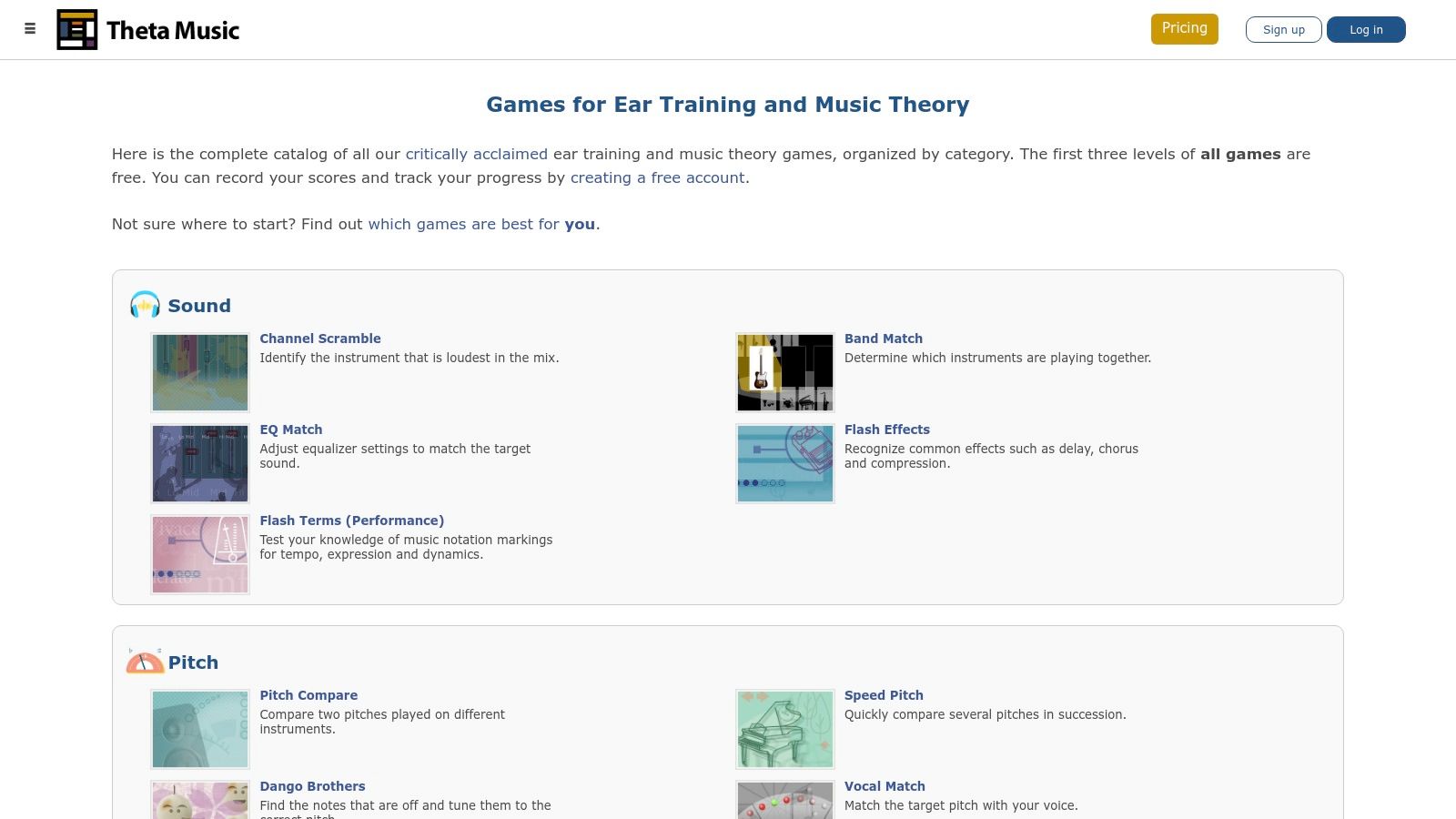
The platform’s strength lies in its comprehensive scope, catering to a wide range of skill levels from beginner to advanced. While initial levels of the games are free, unlocking the full potential and advanced content requires a subscription. Progress tracking is a key feature, giving users clear feedback on their development over time. While the depth of some games might feel steep for absolute novices, the variety ensures that there are accessible entry points for most learners willing to build their skills methodically.
Key Features & Considerations
| Feature | Details |
|---|---|
| Best For | Dedicated ear training, skill-specific practice, self-guided learners. |
| Access | Freemium model. Free access to initial levels; full access requires a subscription. |
| Content | Over 50 games covering pitch, rhythm, harmony, intervals, and scales. |
| Pros | Diverse game selection for targeted skills, personalized training paths, progress tracking. |
| Cons | Full access is behind a paywall; some games have a steep learning curve for beginners. |
Website: Theta Music Trainer
5. PVI Music
PVI Music provides a straightforward collection of free music theory games perfect for targeted practice. It focuses on the fundamentals like note identification, key signatures, and ear training without the complexity of a full curriculum. This makes it an excellent resource for students who need to drill specific skills, whether they are learning piano, guitar, or an instrument using the treble, alto, or bass clef. Its no-frills approach is its greatest strength, offering quick, accessible exercises.
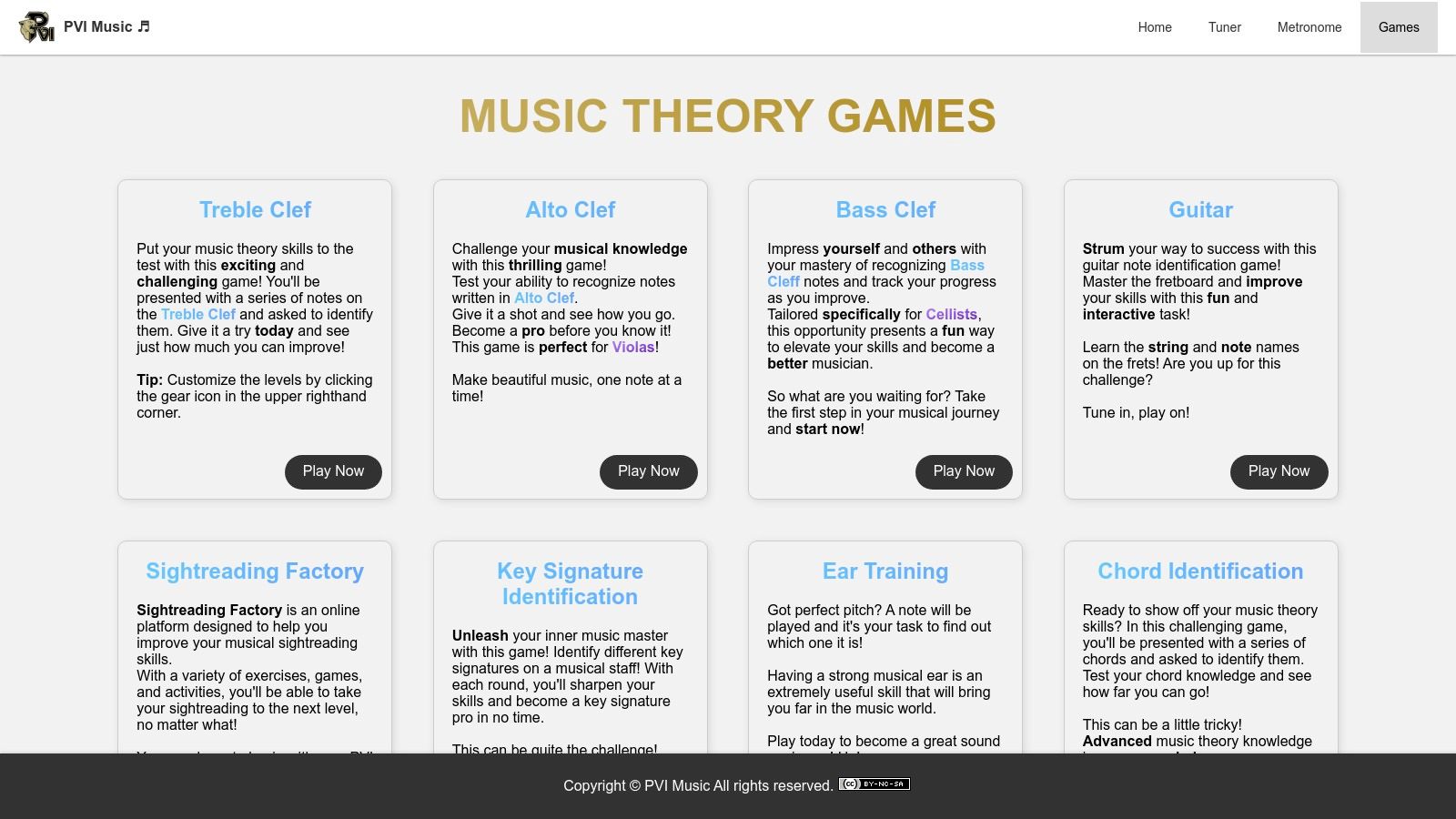
The platform stands out by catering to multiple instruments, with dedicated games for guitar and piano alongside general clef-based challenges. Users can customize the difficulty, making it suitable for a range of skill levels from beginner to intermediate. While it doesn't offer a comprehensive, structured path like some subscription services, PVI Music is an invaluable tool for supplementary practice. Its complete lack of a paywall ensures that essential music theory drills are available to everyone, making it a go-to for quick, effective learning sessions.
Key Features & Considerations
| Feature | Details |
|---|---|
| Best For | Supplemental practice, drilling specific skills like note names and key signatures. |
| Access | Completely free. No login or subscription required. |
| Content | Games for treble, alto, and bass clefs; guitar/piano-specific games; ear training. |
| Pros | Free access to all games, supports various instruments, customizable difficulty. |
| Cons | Limited selection of games; does not offer a comprehensive curriculum. |
Website: PVI Music
6. Stickey Notes
Stickey Notes offers a charming collection of online music theory games designed to make learning notation and fundamental concepts an interactive and enjoyable experience. Created by a piano teacher with a passion for coding, the platform effectively bridges the gap between traditional music education and digital play. Its simple, focused approach is excellent for beginners building their confidence or for more advanced students looking for a quick, fun way to reinforce their knowledge.
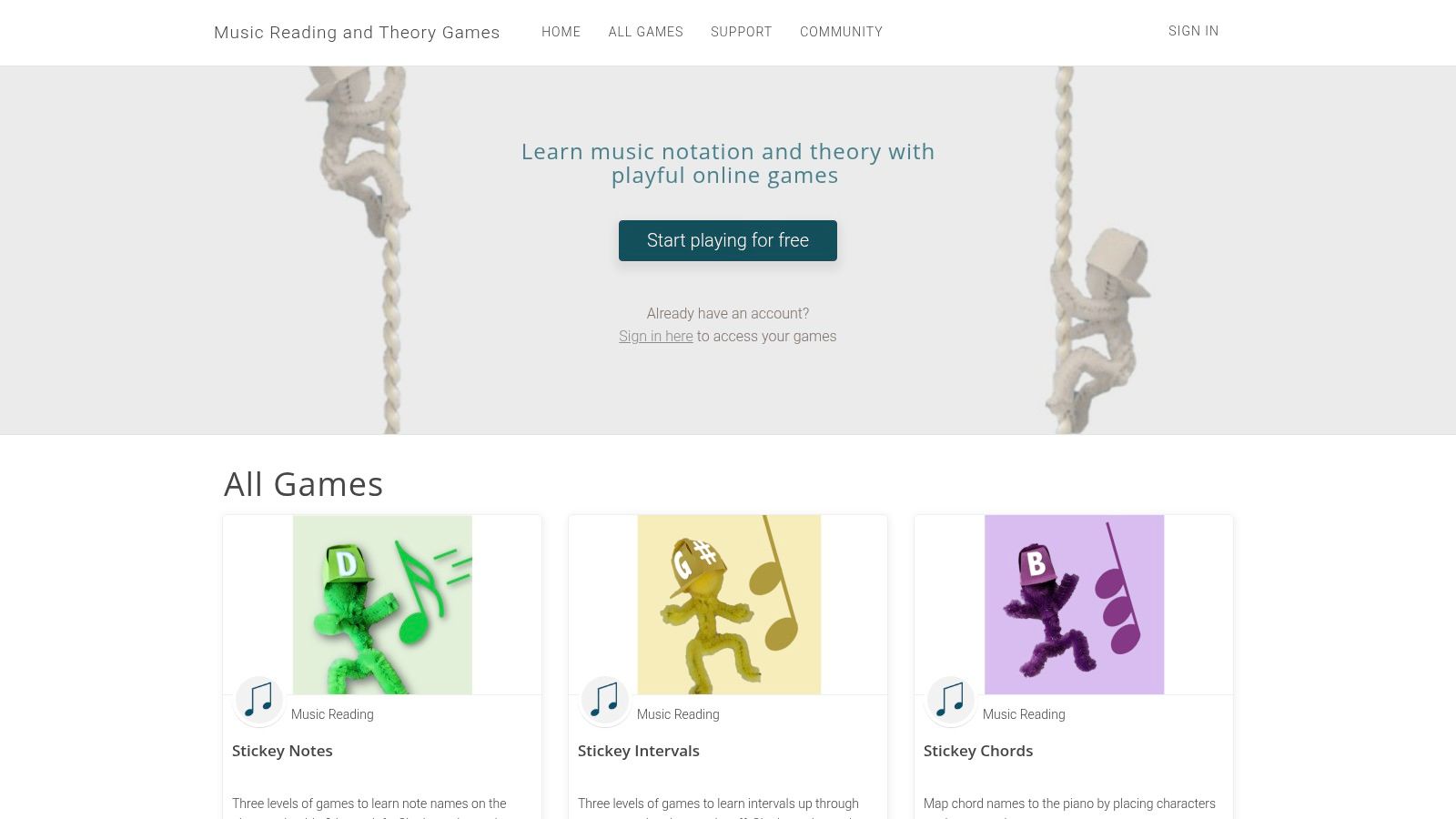
What makes Stickey Notes stand out is its accessibility and straightforward design. Without any need for logins or payments, users can immediately jump into games covering note identification, key signatures, and intervals. The inclusion of single and two-player modes makes it a versatile tool for both solo practice and friendly competition in a lesson setting. While it doesn't offer a comprehensive curriculum, its customizable difficulty levels ensure that these specific music theory games remain challenging and relevant for a wide range of skill sets.
Key Features & Considerations
| Feature | Details |
|---|---|
| Best For | Quick drills, beginner note recognition, competitive classroom fun. |
| Access | Completely free. No account or subscription required. |
| Content | A focused set of games for note names, key signatures, and intervals. |
| Pros | Free and easily accessible, interactive two-player mode, customizable difficulty. |
| Cons | Limited scope of topics; not a complete theory curriculum. |
Website: Stickey Notes
7. MTB Exams
MTB Exams bridges the gap between interactive music theory games and formal, accredited qualifications. It offers structured courses that are regulated by Ofqual (The Office of Qualifications and Examinations Regulation in England), providing a clear pathway from learning to certification. This platform is ideal for students seeking to validate their music theory knowledge through a recognized grading system, complete with learning, practice, and official exam modules.
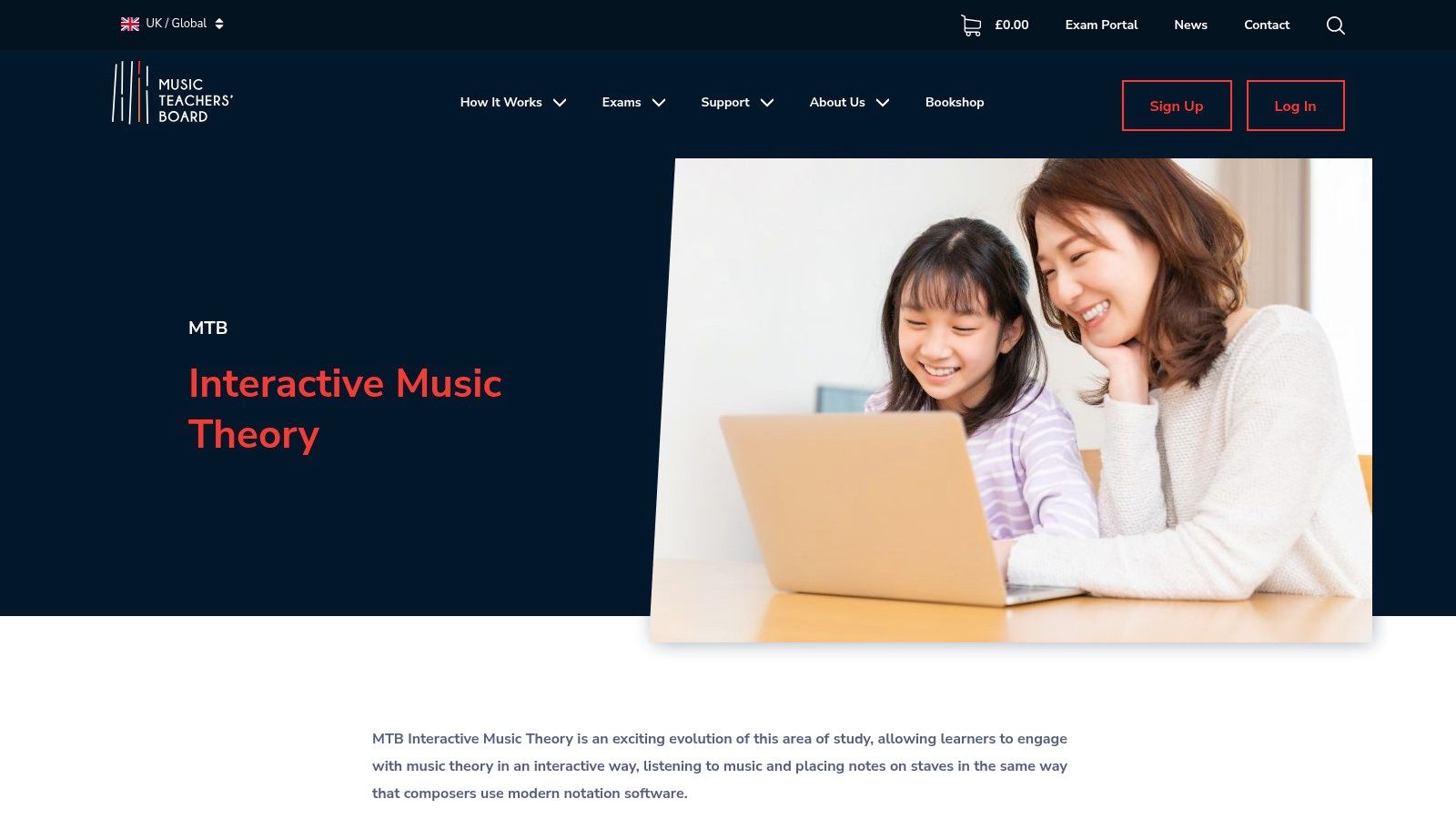
What sets MTB Exams apart is its blend of engaging, randomized practice questions with the rigor of a formal curriculum. Students can take unlimited practice exams, ensuring they are fully prepared before sitting for the real thing. The platform also thoughtfully includes versions for both British and American terminology, making it accessible to a wider international audience. While it requires a commitment to its course structure, it provides a valuable and credible learning experience for dedicated, self-paced learners.
Key Features & Considerations
| Feature | Details |
|---|---|
| Best For | Self-paced learners seeking formal qualifications, structured exam preparation. |
| Access | Course-based access. Pricing details are provided upon inquiry or registration. |
| Content | Graded courses (1-8), interactive lessons, unlimited practice questions, Ofqual regulated exams. |
| Pros | Provides formal, certificated qualifications; unlimited practice builds confidence; supports UK/US terminology. |
| Cons | Less of a casual "game" and more a structured course; pricing is not listed upfront. |
Website: MTB Exams
8. Paperless Piano Teacher's Music Games Club
The Paperless Piano Teacher's Music Games Club is a subscription-based resource designed specifically for music educators looking to inject fresh, fun activities into their lessons. It operates on a simple yet effective model: members receive one brand-new, studio-licensed game each month, keeping lesson material exciting and current. These are not digital apps but printable resources, making them perfect for in-person lessons where tactile interaction is beneficial.
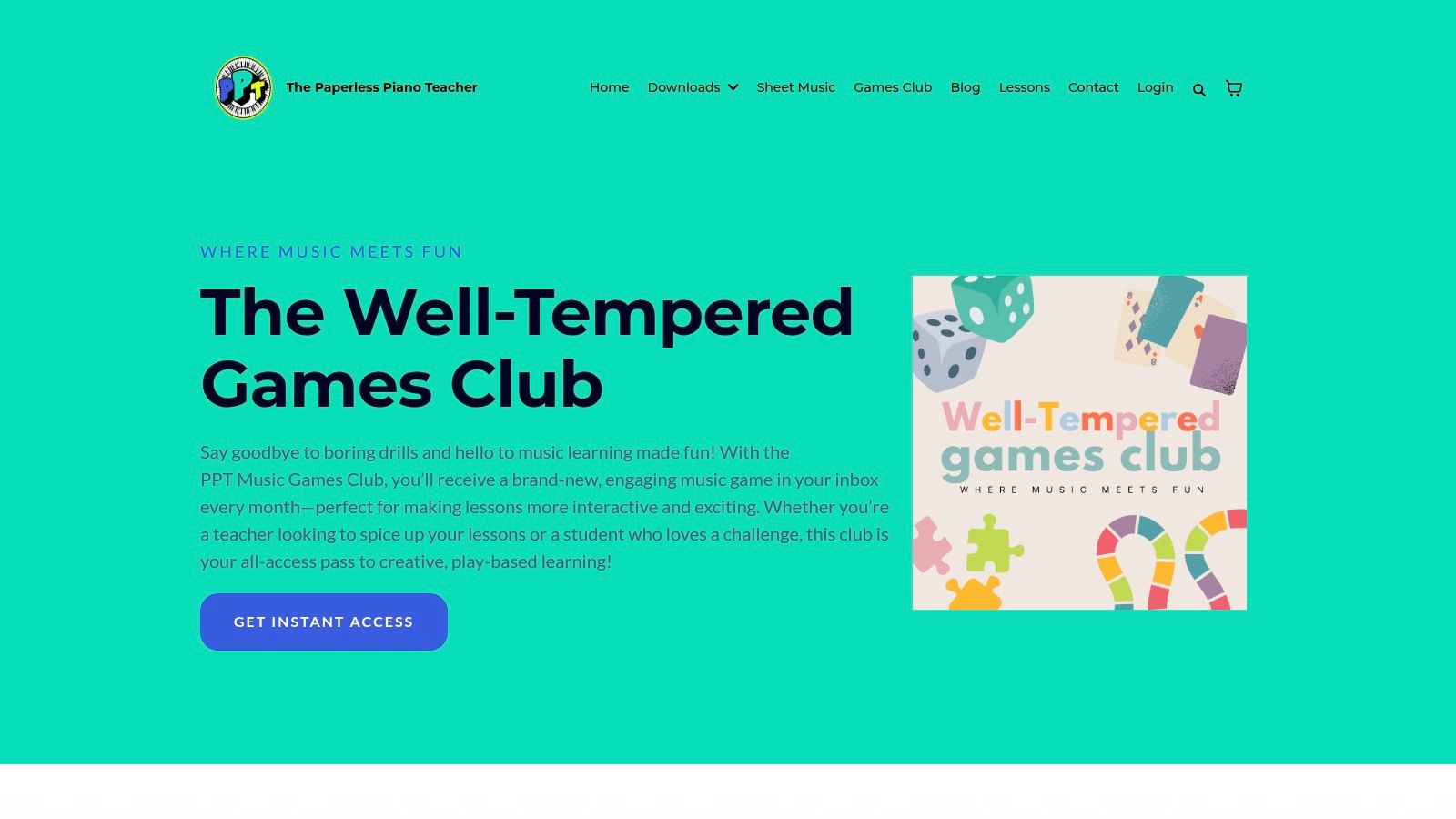
This club's primary strength lies in its focus on the primer to early intermediate levels, targeting foundational concepts in a playful manner. Unlike a static library, the monthly delivery encourages teachers to regularly integrate new music theory games, preventing student boredom. The included studio license is a major advantage, allowing a single teacher to use the games with all their students. While it’s designed for teachers, the engaging nature of the games makes learning feel less like a chore and more like playtime for students.
Key Features & Considerations
| Feature | Details |
|---|---|
| Best For | Private music teachers, group classes, primer to early intermediate students. |
| Access | Low-cost monthly subscription. Printable PDF format. |
| Content | One new printable game per month, full instructions, and a studio license. |
| Pros | Fresh content monthly, very affordable, studio license provides great value. |
| Cons | Requires a subscription; content is printable, not digital/interactive online. |
Website: Paperless Piano Teacher's Music Games Club
9. Toucan Piano
Toucan Piano offers a distinct approach by focusing on downloadable, hands-on music theory games and teaching resources. Rather than a web-based platform, it functions as a digital storefront where educators can purchase and instantly download high-quality, printable materials. Created by experienced music teachers, the resources are designed for direct use in private lessons or small group settings, covering everything from fundamental rhythm exercises to more complex note-reading challenges.
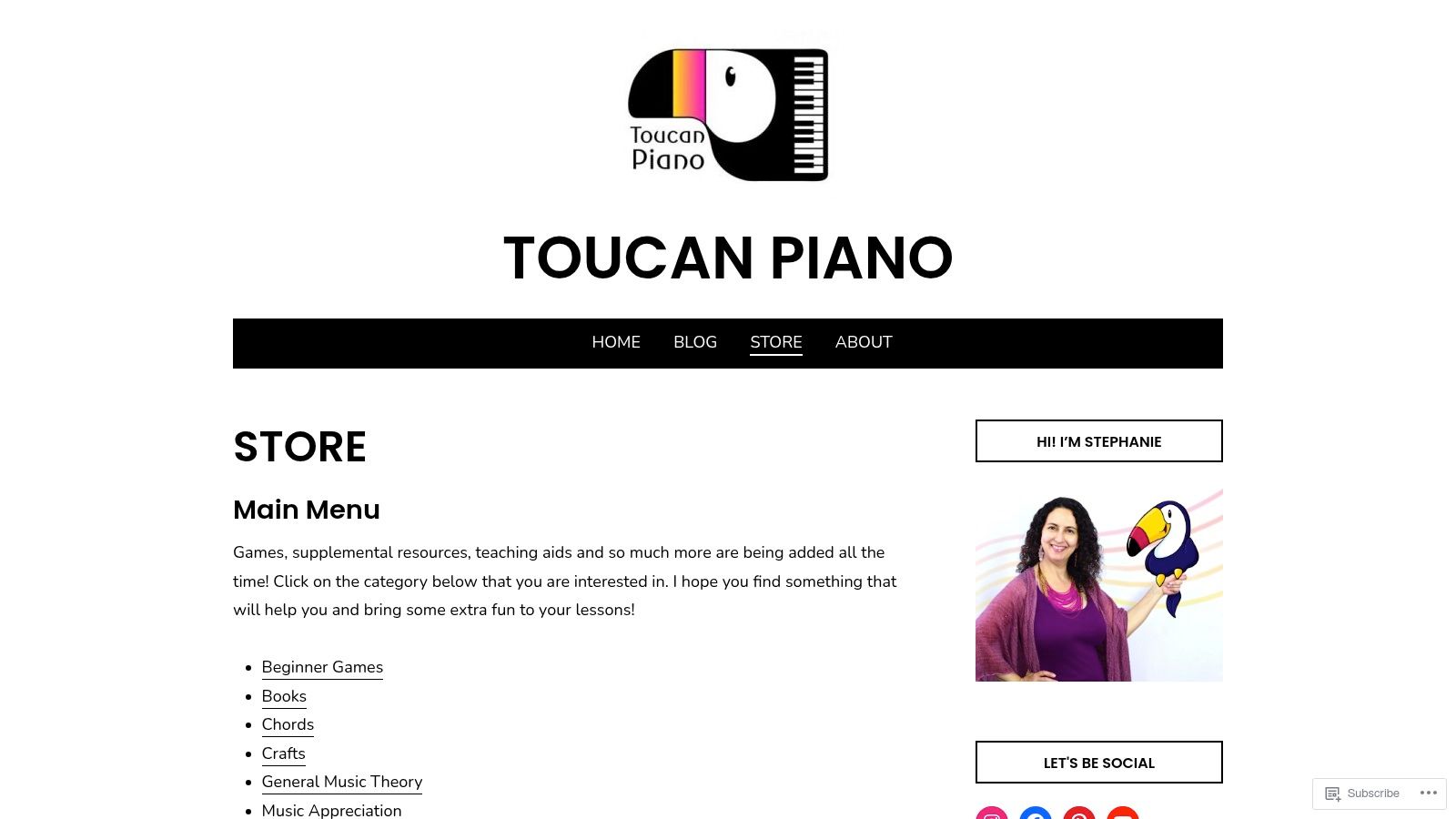
This model is ideal for teachers who prefer tangible, offline activities to supplement their digital tools. The affordability and one-time purchase nature of each game make it easy to build a custom library of resources over time without a subscription commitment. While it requires printing and some initial setup, the tactile engagement these games provide can be highly effective for many students. Its strength lies in providing curated, classroom-tested materials that blend fun with foundational learning.
Key Features & Considerations
| Feature | Details |
|---|---|
| Best For | Private music teachers, hands-on learning, supplementing a core curriculum. |
| Access | Pay-per-item digital downloads. No subscription required. |
| Content | Printable games, rhythm exercises, teaching aids, flashcards. |
| Pros | Affordable, one-time purchases; designed by educators for classroom use. |
| Cons | Requires printing and preparation; not an interactive online platform. |
Website: Toucan Piano
10. 88 Musical Keys
For educators and students who appreciate a hands-on, tangible approach to learning, 88 Musical Keys provides a downloadable set of resources centered around traditional flashcards. It offers a comprehensive collection of 165 music theory flashcards and an accompanying 'Quiz Buster' game, designed to reinforce core concepts like signs, symbols, musical terms, notation, and key signatures. This platform is ideal for teachers who want to incorporate physical, interactive activities into their lessons, moving learning away from the screen.
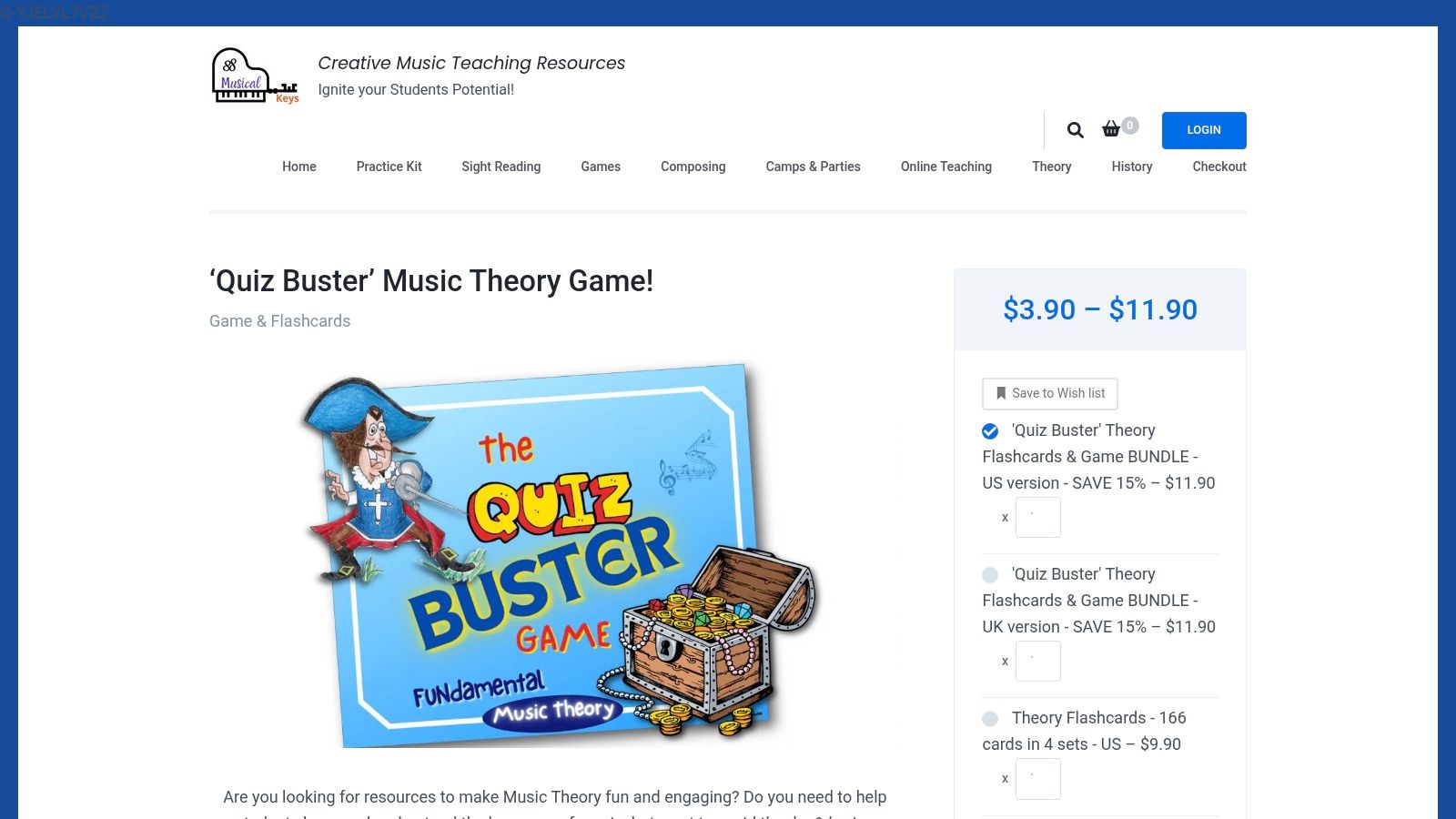
The strength of 88 Musical Keys lies in its simplicity and versatility. The resources are delivered as an instant digital download, allowing for immediate use after printing. The 'Quiz Buster' game transforms standard flashcard drills into a more engaging group activity, making it a great tool for classroom settings or family music practice. While it lacks the dynamic, adaptive nature of online music theory games, its focus on fundamental memorization through a proven, physical format fills a unique niche for learners who benefit from tactile study aids.
Key Features & Considerations
| Feature | Details |
|---|---|
| Best For | Teachers, parents, and students preferring hands-on, offline learning; group activities. |
| Access | One-time purchase for a digital download. Requires printing and preparation. |
| Content | 165 printable flashcards, 'Quiz Buster' game rules, blank card templates. |
| Pros | Comprehensive printable resource, promotes offline interaction, suitable for group and individual study. |
| Cons | Not a dynamic web-based game; one-time purchase with no ongoing updates or new content. |
Website: 88 Musical Keys
11. Amy Gordon Music
Amy Gordon Music offers a refreshingly unique take on music theory games with its "Escape Tone" digital escape room. Moving beyond simple drills, this resource immerses intermediate students in a narrative-driven puzzle. The goal is to solve a series of theory challenges to "escape," making it an excellent tool for collaborative classroom activities or engaging homework assignments. Its design is particularly well-suited for reinforcing concepts that students have already been introduced to.
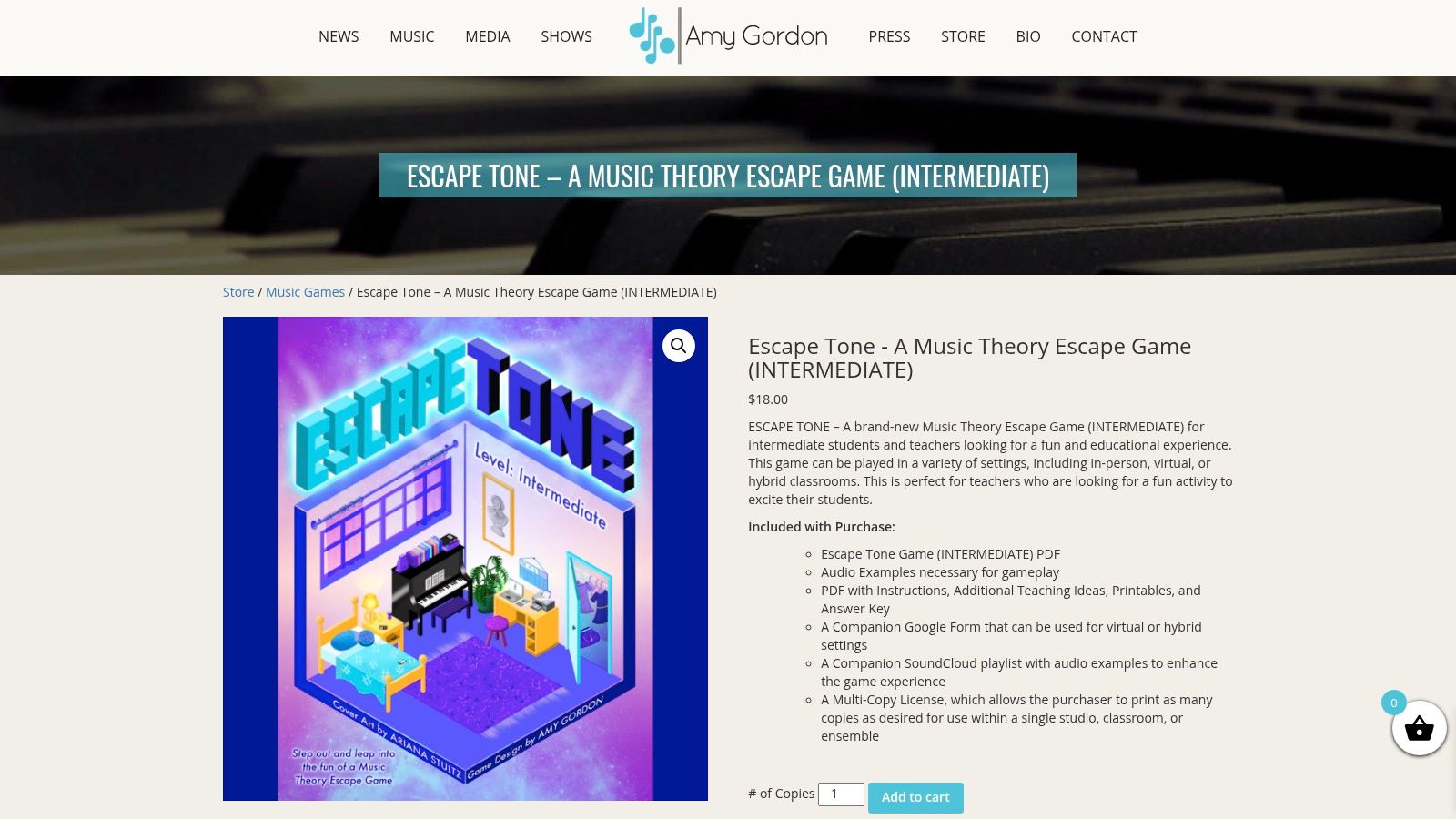
The package stands out for its versatility and thoughtful inclusion of materials for modern teaching environments. It comes with audio examples to aid aural skills and a companion Google Form, making it seamless to implement in virtual or hybrid classrooms. The one-time purchase provides a multi-copy license, allowing teachers to use it with all of their students without recurring fees. While its specific focus on intermediate theory means it isn't for absolute beginners, it provides a memorable and effective review activity.
Key Features & Considerations
| Feature | Details |
|---|---|
| Best For | Intermediate students, classroom review, hybrid/virtual learning environments. |
| Access | One-time purchase for a multi-copy classroom use license. |
| Content | A complete digital music theory escape game with audio and virtual classroom tools. |
| Pros | Highly engaging escape room format, versatile for different teaching settings, comprehensive materials. |
| Cons | Narrowly focused on intermediate-level concepts; not a platform with ongoing content. |
Website: Amy Gordon Music
12. EarMaster
EarMaster is less a single game and more a comprehensive training suite for serious musicians looking to sharpen their aural skills. It offers an extensive, software-based curriculum covering ear training, sight-singing, and complex rhythmic exercises. Its standout feature is the real-time pitch and rhythm feedback, allowing you to sing or play into a microphone and receive instant, accurate analysis of your performance. This makes it a powerful tool for dedicated, self-paced practice.
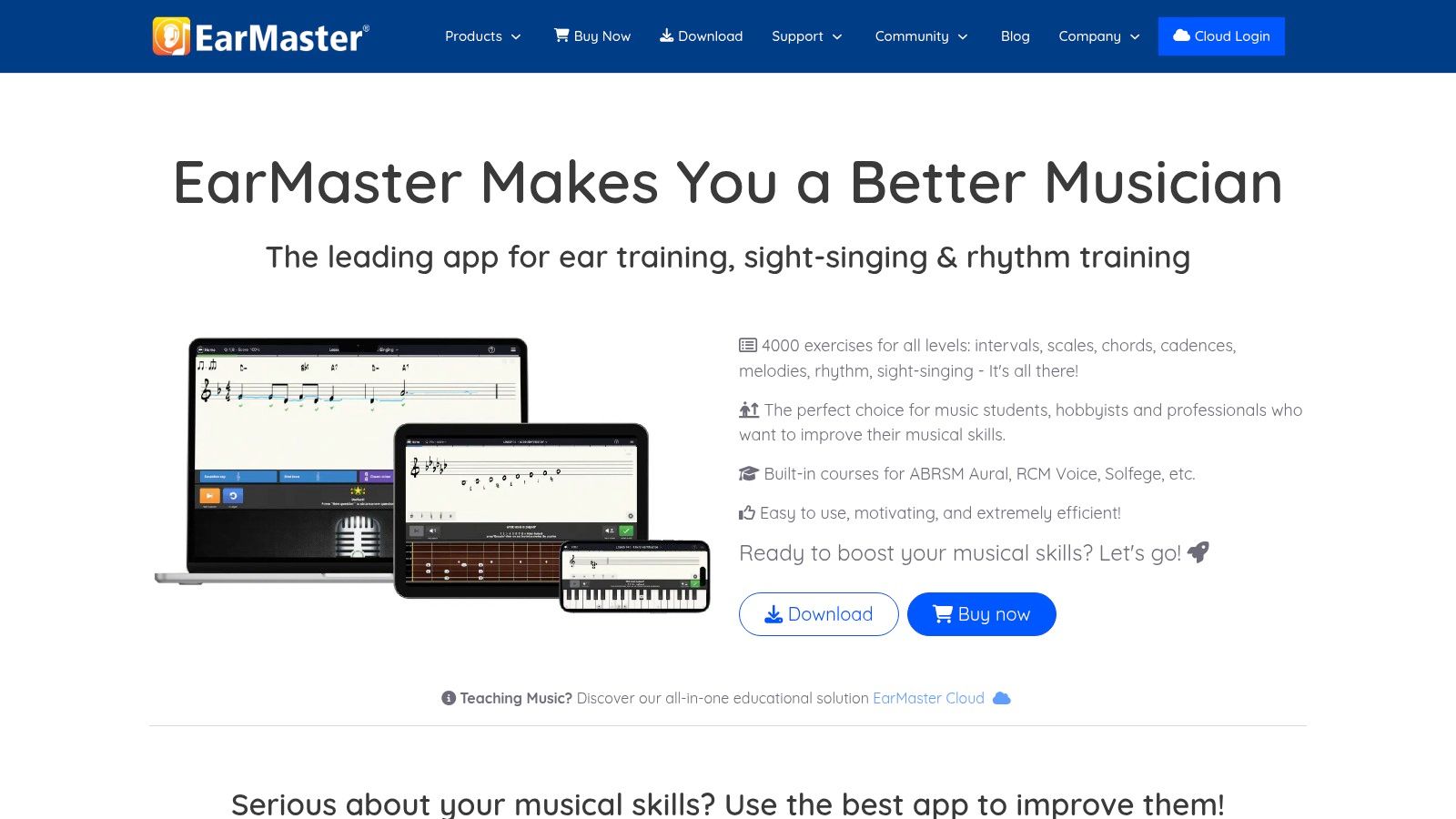
The platform’s strength lies in its depth and structured approach, making it a favorite among university students and professional musicians. With thousands of exercises that automatically adapt to your skill level, it provides a personalized training regimen. While its interface is more functional than playful compared to other music theory games, its compatibility with MIDI devices and its cross-platform availability on desktop and mobile make it an incredibly versatile and powerful resource for anyone committed to mastering music theory and ear training fundamentals.
Key Features & Considerations
| Feature | Details |
|---|---|
| Best For | Serious music students, university-level practice, developing a professional ear. |
| Access | Subscription or one-time purchase. Available on Windows, macOS, iOS, and Android. |
| Content | Ear training, sight-singing, rhythm exercises, real-time feedback, custom exercises. |
| Pros | Highly comprehensive and in-depth, excellent real-time feedback, cross-platform. |
| Cons | Can feel more like academic software than a game; may be overwhelming for casual learners. |
Website: EarMaster
Music Theory Games Feature Comparison
| Product | Core Features ✨ | User Experience ★ | Value Proposition 💰 | Target Audience 👥 | Unique Selling Points 🏆 |
|---|---|---|---|---|---|
| My Ear Training Journey 🏆 | Interactive ear training games, community-driven interval database | Engaging gamified, visible progress ★★★★ | Flexible pricing, free trial 💰💰 | Music students & learners 👥 | Gamified learning, supportive community, user-driven data |
| Three Minute Theory | 80 video lessons, 230+ games, composer AI | Interactive, choose-your-adventure ★★★ | Subscription-based 💰 | Educators & classrooms 👥 | AI composer interviews, no student logins |
| Learnatune Music Games | 160+ games, customizable, multiplayer | Interactive & fun ★★★ | Affordable subscription 💰 | Teachers & learners 👥 | Multiplayer mode, customizable games |
| Theta Music Trainer | 50+ games, personalized training, progress tracking | User-friendly, free trial ★★★ | Subscription pricing 💰 | Beginners to advanced 👥 | Diverse skills covered, personalized paths |
| PVI Music | Free games for various instruments, difficulty levels | Simple & accessible ★★ | Free access 💰 | Multi-instrument learners 👥 | Free, instrument-specific games |
| Stickey Notes | Single/two-player modes, difficulty levels | Interactive & fun ★★ | Free access 💰 | Beginners & advanced learners 👥 | Personalized learning, free games |
| MTB Exams | Interactive courses, graded qualifications | Structured & comprehensive ★★★ | Pricing not specified 💰 | Self-paced students & educators 👥 | Ofqual regulated certificates |
| Paperless Piano Teacher's Music Games Club | Monthly new games, studio license | Fun & educational ★★ | Affordable subscription 💰 | Educators, beginner students 👥 | Monthly fresh content, studio license |
| Toucan Piano | Downloadable games & materials, updated content | Quality & varied ★★ | One-time purchase 💰 | Various skill levels 👥 | Experienced educators, instant downloads |
| 88 Musical Keys | 165 flashcards, theory game, digital download | Engaging & interactive ★★ | One-time purchase 💰 | Individual & group learners 👥 | Comprehensive flashcards, group use |
| Amy Gordon Music | Escape game format, audio examples, virtual support | Unique & engaging ★★ | One-time purchase 💰 | Intermediate learners 👥 | Escape-room style learning, virtual classroom ready |
| EarMaster | Ear training, sight-singing, rhythm, MIDI support | Comprehensive, multi-platform ★★★ | Pricing not specified 💰 | Self-paced learners 👥 | Real-time pitch detection, multi-platform |
Choosing the Right Game for Your Musical Journey
Navigating the world of music theory games can feel like exploring a vast and varied landscape. As we've journeyed through this curated list, from the comprehensive, professional-grade suite of EarMaster to the targeted, classroom-ready resources of Three Minute Theory and the engaging community of My Ear Training Journey, one truth becomes clear: the "best" tool is entirely personal. It's the one that aligns with your specific goals, learning style, and daily routine.
The sheer variety is a testament to the different paths we all take in our musical education. Your ideal choice isn't just about features; it's about finding a platform that transforms a potentially dry subject into an exciting daily challenge. The power of these tools lies in their ability to make consistent practice feel less like a chore and more like play.
How to Select Your Perfect Practice Partner
Making the right choice requires a moment of self-assessment. To pinpoint the game that will serve you best, consider these critical questions:
- What is my primary goal? Are you a vocalist focused on interval recognition? A pianist trying to master sight-reading? A student preparing for ABRSM or MTB exams? Tools like Theta Music Trainer and PVI Music excel at targeted ear training, while apps like Stickey Notes are built specifically for note recognition.
- What is my learning style? Do you thrive on competition and leaderboards, like those found in Toucan Piano? Or do you prefer a structured, curriculum-based approach offered by platforms like MTB Exams or Amy Gordon Music? Perhaps a simple, no-frills tool like 88 Musical Keys is all you need for quick drills.
- What is my role? A self-directed student has different needs than a private music teacher. Teachers will find immense value in resources like the Paperless Piano Teacher's Music Games Club, which offers a treasure trove of printable and digital assets for studio use. Independent learners might gravitate towards a more holistic platform that guides their progress.
Actionable Steps for Implementation
Once you’ve narrowed down your options, don't hesitate to take advantage of free trials and demo versions. This hands-on experience is invaluable. Spend a week with one or two platforms that seem promising. See how they fit into your schedule. Is the interface intuitive? Do the exercises hold your attention?
Ultimately, the most effective music theory games are the ones you consistently use. Integrating a five-to-ten-minute session into your daily practice can yield remarkable results over time. The key is to find that sweet spot where a game is challenging enough to drive progress but enjoyable enough to keep you coming back. This consistent, low-stakes engagement is what builds deep, intuitive musical understanding. Your musical journey is unique, and with the right digital companion, it can be a deeply rewarding and enjoyable adventure.
If you're looking to turn ear training into a collaborative and motivating experience, consider starting with My ear training journey. It combines the structured drills of traditional music theory games with a supportive community to share your progress and stay inspired. Join us and discover how fun your musical growth can be at My ear training journey.